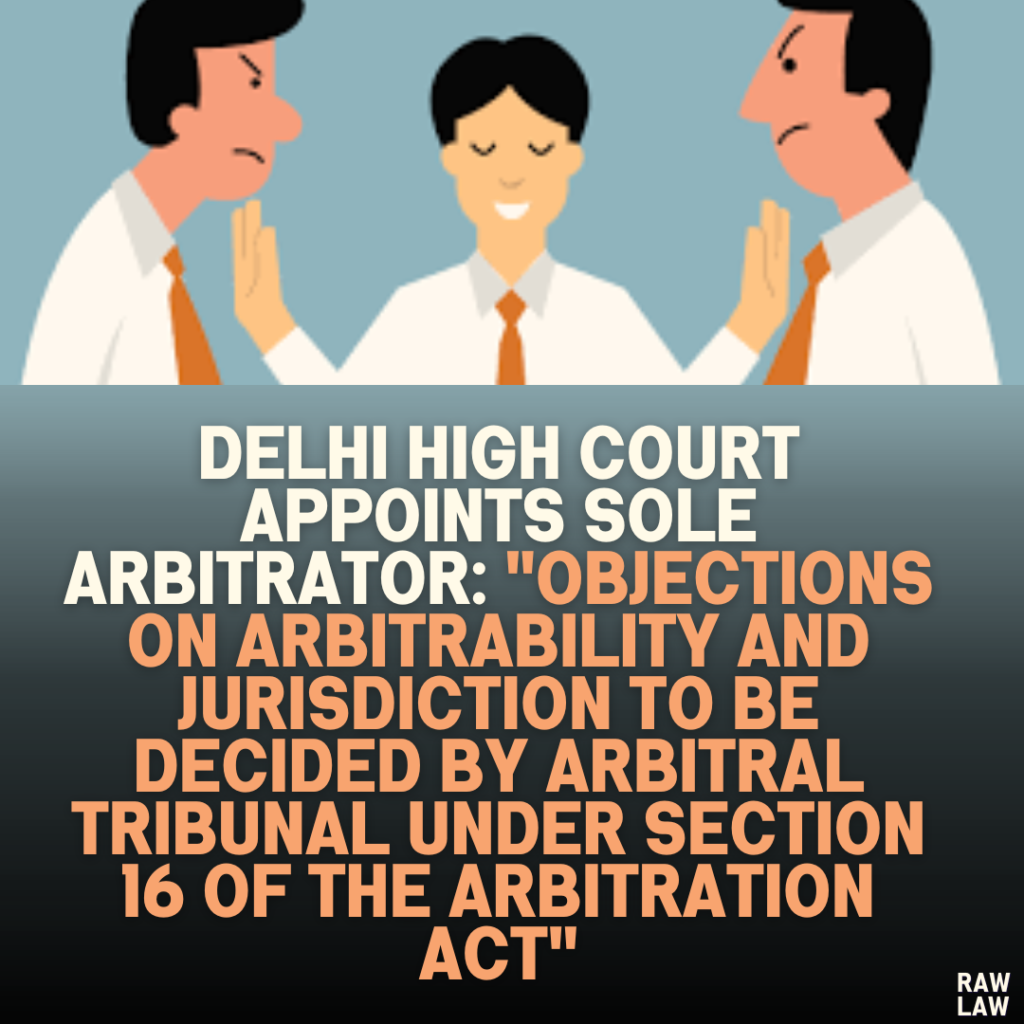Court’s Decision
The High Court of Delhi, under Section 11 of the Arbitration and Conciliation Act, 1996, appointed Justice (Retd.) Indu Malhotra, Former Judge of the Supreme Court, as the Sole Arbitrator to adjudicate disputes arising out of a Share Purchase Agreement dated April 20, 2020. The court clarified that objections to the arbitrability of the claims or the tribunal’s jurisdiction could be raised before the arbitrator and must be resolved in accordance with the law.
Facts
- The Share Purchase Agreement: The disputes emerged from a Share Purchase Agreement that included an arbitration clause. The clause mandated that any disputes or conflicts be resolved through arbitration by a sole arbitrator, with the arbitration seat in New Delhi, conducted in English under the Arbitration and Conciliation Act, 1996.
- Invocation of Arbitration: On February 14, 2024, the petitioner sent a notice invoking arbitration, suggesting the name of Justice (Retd.) Indu Malhotra as the sole arbitrator to resolve the disputes.
- Response from the Respondents: Although the respondents acknowledged the existence of an arbitration agreement, they disputed the merits of the claims. They pointed to ongoing proceedings before the National Company Law Tribunal (NCLT) but did not object to the appointment of Justice (Retd.) Indu Malhotra.
- Petition Filed: The petitioner approached the Delhi High Court for the appointment of an arbitrator after the parties failed to reach a consensus on the arbitrator’s nomination.
Issues
- Whether the court could appoint an arbitral tribunal when objections were raised concerning the arbitrability of the disputes.
- Whether Justice (Retd.) Indu Malhotra was a suitable appointee to adjudicate the disputes.
Petitioner’s Arguments
- The petitioner asserted that the arbitration clause was valid and binding, requiring the disputes to be resolved through arbitration.
- They relied on precedents from the Supreme Court, contending that once an arbitration agreement’s existence is established, the court is obligated to appoint an arbitrator.
- Objections regarding jurisdiction or arbitrability, they argued, must be addressed by the arbitral tribunal as per established legal principles.
Respondent’s Arguments
- The respondents emphasized pending proceedings before the NCLT to challenge the merits of the petitioner’s claims.
- They did not, however, dispute the validity of the arbitration agreement or the proposed appointment of Justice (Retd.) Indu Malhotra.
- They reserved their objections concerning arbitrability for consideration during arbitration proceedings.
Analysis of the Law
The court examined Section 11 of the Arbitration and Conciliation Act, 1996, which governs the appointment of arbitrators. It highlighted that:
- As long as an arbitration agreement’s existence is undisputed, the court must prioritize the appointment of an arbitrator.
- Objections concerning arbitrability or jurisdiction should be left to the arbitrator under Section 16 of the Act (the “Kompetenz-Kompetenz” principle).
The court referred to two key Supreme Court judgments:
- Interplay between Arbitration Agreement under the Arbitration and Conciliation Act, 1996 and the Indian Stamp Act, 1899, 2023 SCC OnLine SC 1666: This case established that courts should defer to arbitral tribunals for deciding objections regarding arbitrability once a valid arbitration agreement is proven.
- SBI General Insurance Co. Ltd. v. Krish Spinning, 2024 SCC OnLine SC 1754: The judgment reaffirmed the principle that objections to arbitrability do not bar the court from appointing arbitrators.
Precedent Analysis
- The court noted that earlier cases clearly emphasized the role of the arbitral tribunal in resolving disputes concerning jurisdiction and arbitrability.
- In the absence of specific objections to the arbitration clause, the court was bound to appoint an arbitrator.
Court’s Reasoning
- The arbitration agreement explicitly covered disputes “arising out of or relating to the Share Purchase Agreement,” making it clear that the claims fell within its scope.
- The respondents did not challenge the validity of the agreement or the proposed arbitrator, thereby allowing the court to proceed with the appointment.
- To maintain consistency and efficiency, the court appointed Justice (Retd.) Indu Malhotra, who was already arbitrating related disputes between the same parties.
Conclusion
The court appointed Justice (Retd.) Indu Malhotra as the Sole Arbitrator to adjudicate the disputes, directing her to comply with disclosure requirements under Section 12 of the Arbitration and Conciliation Act. The arbitrator was authorized to hear and decide all objections, including jurisdictional challenges, in accordance with the law.
The court clarified that the present order did not reflect any opinion on the merits of the claims and that the respondents retained their right to raise preliminary objections during arbitration proceedings.
Implications
- Legal Clarity: The ruling reinforces the principle that courts must defer disputes on arbitrability to the arbitral tribunal, fostering a pro-arbitration approach.
- Efficient Dispute Resolution: By appointing a single arbitrator for related disputes, the court ensured consistency and reduced the risk of conflicting rulings.
- Judicial Economy: The decision underscores the limited role of courts in arbitration, focusing on facilitating the process rather than intervening prematurely.



